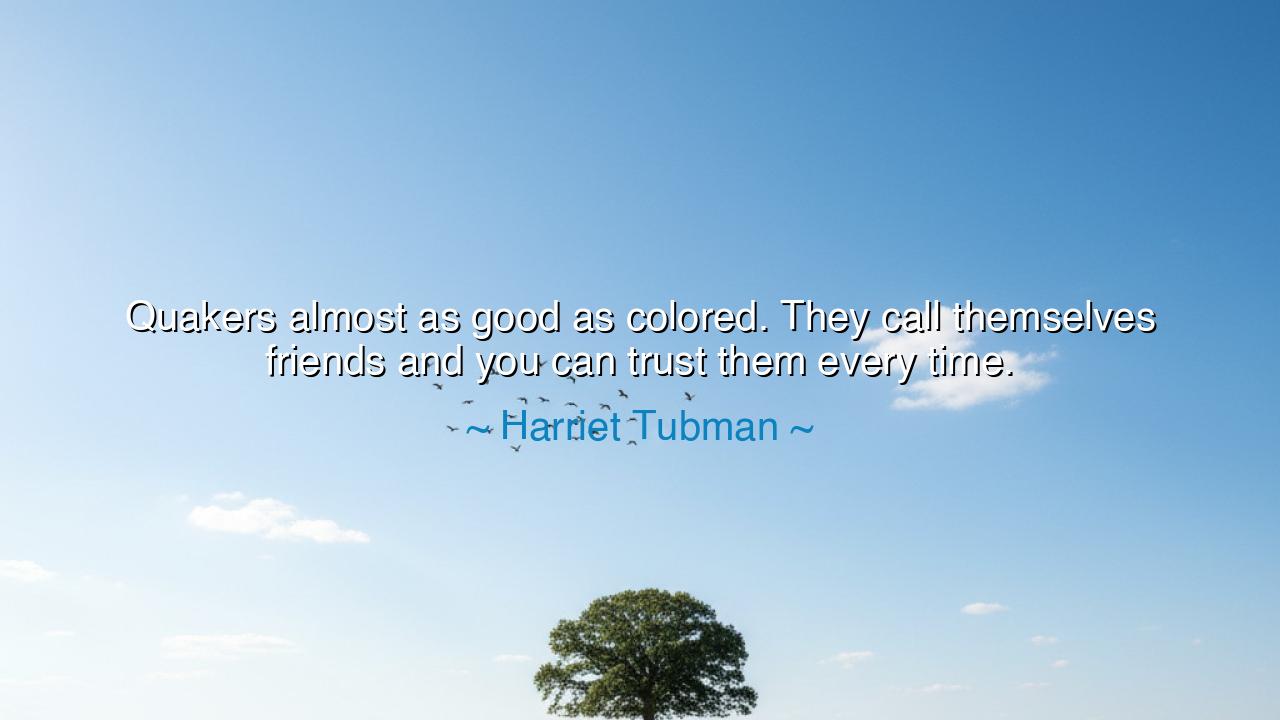
Quakers almost as good as colored. They call themselves friends
Quakers almost as good as colored. They call themselves friends and you can trust them every time.






The words of Harriet Tubman, “Quakers almost as good as colored. They call themselves friends and you can trust them every time,” are more than a fragment of speech; they are the echo of a heart that knew both the depths of suffering and the heights of deliverance. Spoken by the woman who braved night, river, forest, and man’s cruelty to lead her people to freedom, these words carry the fragrance of truth forged in the furnace of peril. Tubman did not scatter her trust lightly; she gave it to those who proved, time and again, that they were steadfast in deed as well as in word.
The Quakers, known formally as the Religious Society of Friends, bore a name that spoke not of dominion but of humility: Friends. In an age when skin color was made a brand of bondage and a badge of shame by the oppressor, they stood apart, daring to see humanity before hue, spirit before skin. They were among the earliest white communities to denounce slavery, not only with their tongues but with their hands, opening homes and barns to serve as stations along the Underground Railroad. Tubman’s praise was not mere courtesy; it was testimony rooted in survival. When she said one could “trust them every time,” she meant that when the hounds of the slave-catcher closed in, the Friends would not betray, but shelter.
Consider the story of Thomas Garrett, a Quaker from Delaware, who became one of Tubman’s most trusted allies. Garrett aided hundreds of fugitives, providing shoes, clothes, and guidance on the treacherous journey north. Once, fined heavily for his defiance of slave laws, he declared before the court, “If you think you can make me pay for doing my duty to God, then you must do it. But you cannot make me stop.” Tubman herself often passed through his care, and with men like him she found not just aid, but a living embodiment of her words: trust every time, without fail.
Yet Tubman’s words reveal more than gratitude. They unveil a deeper kinship she sensed between the enslaved and the Friends. “Almost as good as colored,” she said, not to diminish the Quakers, but to exalt the solidarity she felt. The enslaved bore chains on their bodies, while the Quakers bore chains of conscience in a society that despised their defiance. Both groups were outsiders in the eyes of the ruling order. In this shared marginality, Tubman found fellowship, and she lifted them near to the level of her own people, who endured the harshest yoke yet retained dignity unbroken.
This quote also carries within it the weight of trust—a rare and priceless thing in a world laced with betrayal. For Tubman, betrayal meant death, capture, or return to chains. And yet, amidst the thorns, she found roses: people who lived their creed, who did not falter when the price of justice was high. The Quakers showed that trust is not born in easy times, but in fire-tested loyalty. To say they could be trusted “every time” is to say they proved themselves in the hour of greatest danger, when others would flee.
The lesson that descends to us is this: true friendship is shown in deeds, not words. The Friends were not merely thinkers or sympathizers, but actors who staked their lives and fortunes on what they believed. In every age, oppression wears new faces, yet it still thrives on silence and safe distance. To be like the Quakers that Tubman praised is to risk one’s comfort for another’s freedom, to become a shelter for the vulnerable, a light for those stumbling in darkness.
Therefore, O listener, take these words into your heart as more than history. Ask yourself: who, in your world, bears chains unseen? Who walks in fear, while others walk in ease? The call of the ancients is that you, too, become a Friend—one who can be trusted every time, not just in ease, but when it costs dearly. Give without counting the price, speak when silence is safe, stand where others kneel to injustice. In this way, the words of Harriet Tubman will not remain in the pages of memory, but live again in your deeds.
For in the end, what she saw in the Quakers was the reflection of the eternal truth: that the measure of a soul is not its color, its wealth, nor its station, but its courage to be faithful in love. May we, like them, earn the title of Friend, and may others say of us—as Tubman once said of them—that we, too, can be trusted every time.






AAdministratorAdministrator
Welcome, honored guests. Please leave a comment, we will respond soon